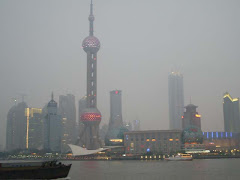A student in my large East Asia lecture survey posed a good question in an email last night. This student asked, “How large of an impact will the ‘Buy American’ clause ultimately have on China’s economy? Does steel still have a large economic impact on China?
China has overcome the "bad old days" of backyard furnaces from the Great Leap era, and its modern steel-producing capacity is extremely robust. In 2008 China produced about 500 million tons of steel, and China's domestic steel consumption was nearly 430 million tons (figures from the "China Economic Net" web-site 2/16/09). Much of China's steel production goes into domestic construction, which was rising steadily for about 15 years UNTIL last year. At one point, Chinese was buying up much of the world's scrap steel to make up for the gap in its own production. However, the price of steel has fallen since the end of last year, and the number of these domestic construction projects has fallen as well.
In 2008 the US steel industry exported 12 million tons of steel from the country's overall production (the figure for which I can't locate right now), which is less than half the Chinese export figure, but I'm not certain how much US steel went to China and how much Chinese steel last year came to the US. I assume that higher quality US steel must have a market in China for specialized uses, while cheaper Chinese steel makes economic sense in some US markets, thus the interdependence of the two industries. Manufactured goods rather than steel play the most important parts in China's exports to the US. However, China needs to maintain all domestic production for political and social reasons as well. To maintain the economic growth necessary to prevent social unrest in China, which some analysts state is over 9%, the Beijing government is very wary of any protectionist suggestions from the US. Upsetting the current import/export volumes between the US and China could have a dramatic effect on Chinese society.
China does engage in some economic protectionism, but the country currently does not maintain high tariffs, compared to other emerging economies. In 1982 China imposed a general import tariff of 56% while today the figure (post-WTO membership) is close to 15% (cited by China economist Nicholas Lardy, formerly at alma mater, the University of Washington). China is also by some measure the world's third largest importer of foreign-made goods. The "Buy American" debate seems to be a political matter that doesn't directly reflect the economic reality of the Sino-US relationship.
On the New York Times web-site, there is an on-going debate of this issue that you might find interesting: http://roomfordebate.blogs.nytimes.com/2009/02/11/that-buy-american-provision/
Tuesday, February 17, 2009
Subscribe to:
Posts (Atom)
